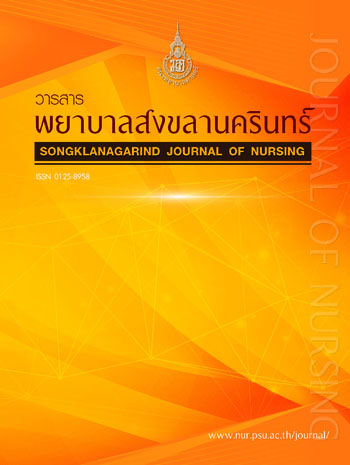Effectiveness of Self-Efficacy Enhancing Program on Health Behaviors, Body Weight, and Waist Circumference of Nursing Students with Overweight
Main Article Content
Abstract
The objective of this quasi-experimental study was to examine the effects of the self-efficacy
enhancing program on health behaviors, weight, and waist circumference of the nursing students with
overweight. Fifty-four nursing students were purposively selected to participate in a 6 month program of
emphasizing self-efficacy. The program was developed based on Bandura’s self-efficacy theory including
providing information of diet control, exercise, appropriate stress management, role model, counseling during
behavior modification by peer group, Calories Application on smart phone, telephone follow-up, and
physiological and emotional arousal activities. Instruments used in data collection consisted of demographic
datasheet, health behavior questionnaire, weighing scales and tape measure. The health behavior questionnaire
was content validated by 3 experts as with content validity index 0.92 and internal consistency reliability
tested using Cronbach’s alpha coefficient: yielding value of 0.83. The changes in health behaviors, weight,
and waist circumferences between before the intervention, 1 month, and 6 months after the intervention,
were compared using Repeated Measures ANOVA and Scheffe. The results showed that after 6 months,
mean score of overall health behaviors in terms of diet, exercise and stress management were significantly
higher, whereas mean weight, and waist circumference were lower than those of before the intervention and
1 month after the intervention (p < 0.01).
In conclusion, the findings suggest that training in self-efficacy for health behavior change may be
benefit for weight loss and waist circumference reduction. Long term follow-up for behavior maintenance
should be evaluated.


